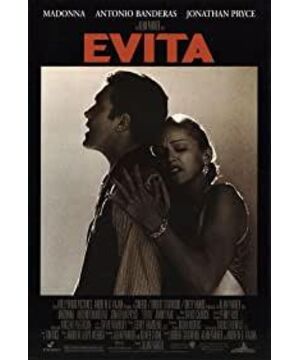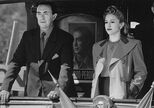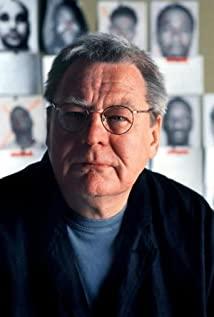Originated from Andrew Lloyd Webber and Tim Rice's concept album in 1976, later a musical, Alan Parker's belated film adaptation, taking the baton from Oliver Stone, who receives a writing credit here, is the closest call for Madonna to elevate her status as a serious actor, but ultimately an Oscar nomination still eludes her, albeit this marks her most sterling performance on the silver screen.
This extravagant musical about Eva Péron (1919-1952), the wife of Argentine President Juan Perón (1895–1974) and First Lady of Argentina, takes a traditional cradle-to-grave narrative and applies singing to its dialogues, not exactly recitative, but a sing-song rhythm that is more attuned to our listening habit, this approach largely dulls the edge of the jarring impression resulted from the transition from speaking parts to singing parts in most musicals, at least, tonally, there is harmony from A to Z.
For those who are intrigued by biographical nuggets, EVITA has little to offer, mostly because the narrative routinely goes through those important occurrences in Eva's brief but incredible life accompanied entirely by musical numbers, if you are unfamiliar with the story's backstory, what you can apprehend is very schematic, and Antonio Banderas' character Ché, an imaginative cipher represents the have-nots (aka. the “descamisado”), whose attitude towards Eva is rather misogynous and totally from a man's sexist point of view (she is a social climber , but in a patriarchal society, what do you expect an ambitious woman to do?), isn't the best idea to cater to today's audience.
Deemed by many as a vanity project, EVITA has been controversial since the moment when Madonna is cast as Eva, boycotting from Argentina for fear of desecrating the country's “spiritual leader”, but Madonna herself sees more commonality than divergence in her and Eva, both hail from the low social stratum, and manage to scale to the upper echelon. Only Eva's life is curtailed by her poor health, she shines refulgently but fugaciously, the pathos is that died at an early age of 33, she has so much yet to offer. Using that as an entry for empathy, EVITA piles on the mass' grief-ridden reaction of Eva's departure, Parker captures captivating portraits but whys and wherefores are wanting, it is a biography about a political figure, but EVITA is cravenly apolitical.
Even so, on the strength of Madonna's vocal prowess, which is at its zenith in such fine numbers like the Oscar-winning melody YOU MUST LOVE ME (a new song written specifically for the film by Webber and Rice), and of course the immortal DON'T CRY FOR MY ARGENTINA, EVITA is aurally pleasing, Madonna's operatic rendition has a distinctive non-opera flair, her register is never orotund, but there is strength within, she is the sole star. In comparison, both Banderas and Price ( who plays Juan) cannot hold a candle to her.
It is axiomatic that EVITA should maxes out Madonna's strongest suit, her singing, but in terms of real acting moments, they are at a premium because of the film's de-dramatized approach, Madonna still can turn heads but her portrayal of Eva is only skin deep and she is not entirely accountable for it, you cannot make a silk purse out of a sow's ear, or in this particular case, dare I say, Mr. Parker's misconception?
referential entries: Parker's BUGSY MALONE (1976, 6.6/10); Madonna's WE (2011, 5.9/10).
Title: Evita
Year: 1996
Genre: Biography, Musical, History
Country: USA
Language: English
Director: Alan Parker
Screenwriters: Alan Parker, Oliver Stone
based on the book by Tim Rice
Music: Andrew Lloyd Webber
Cinematography: Darius Khondji
Editing: Gerry Hambling
Cast:
Madonna
Antonio Banderas
Jonathan Price
Jimmy Nail
Andrea Corr
Olga Merediz
Rating: 6.7/10
View more about Evita reviews











